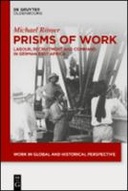Explore

The phenomenon of labour takes the character of a prism. Labour is thereby always context dependent and constituted through the actions of all protagonists involved in any labour relationship. On the basis of three case studies in colonial German East Africa – the construction of the Central Railway (1905–1916), the Otto Plantation in Kilossa (1907–1916) and the palaeontological Tendaguru Expedition (1909–1911) – labour and labour relations are analysed. The focus lies on hitherto neglected actors and groups of actors of labour in the colonial context of East Africa. These were especially German companies and their staff, white subaltern railway sub-contractors and labour recruiters, Indian skilled workers and (qualified) East African workers. Furthermore, all three sites of labour proved to have their individual logics and characteristics. But all of them were in tension between the ‘global’ and the ‘local’, coercion and voluntariness, machine and manual labour, skilled and unskilled labour, reproductive and wage labour, as well as between black and white. Michael Rösser’s dissertation has been awarded with ‘honorary distinction’ by the European Network in Universal and Global History (ENIUGH). ; The phenomenon of labour takes the character of a prism. Labour is thereby always context dependent and constituted through the actions of all protagonists involved in any labour relationship. On the basis of three case studies in colonial German East Africa – the construction of the Central Railway (1905–1916), the Otto Plantation in Kilossa (1907–1916) and the palaeontological Tendaguru Expedition (1909–1911) – labour and labour relations are analysed. The focus lies on hitherto neglected actors and groups of actors of labour in the colonial context of East Africa. These were especially German companies and their staff, white subaltern railway sub-contractors and labour recruiters, Indian skilled workers and (qualified) East African workers. Furthermore, all three sites of labour proved to have their individual logics and characteristics. But all of them were in tension between the ‘global’ and the ‘local’, coercion and voluntariness, machine and manual labour, skilled and unskilled labour, reproductive and wage labour, as well as between black and white. Michael Rösser’s dissertation has been awarded with ‘honorary distinction’ by the European Network in Universal and Global History (ENIUGH).
This book is included in DOAB.
Why read this book? Have your say.
You must be logged in to comment.
Rights Information
Are you the author or publisher of this work? If so, you can claim it as yours by registering as an Unglue.it rights holder.Downloads
This work has been downloaded 77 times via unglue.it ebook links.
- 77 - pdf (CC BY) at Unglue.it.
Keywords
- 20th century history: c 1900 to c 2000
- African history
- Arbeit
- colonialism
- East Africa
- global history
- Globalgeschichte
- History
- History: earliest times to present day
- History: specific events & topics
- Humanities
- Industrialisation & industrial history
- Infrastructure
- Infrastruktur
- Kolonialismus
- labour
- Modern history to 20th century: c 1700 to c 1900
- National liberation & independence, post-colonialism
- Ostafrika
- Regional & national history
- Social & cultural history
- thema EDItEUR::3 Time period qualifiers::3M c 1500 onwards to present day
- thema EDItEUR::3 Time period qualifiers::3M c 1500 onwards to present day::3MP 20th century, c 1900 to c 1999
- thema EDItEUR::N History and Archaeology
- thema EDItEUR::N History and Archaeology::NH History::NHH African history
- thema EDItEUR::N History and Archaeology::NH History::NHT History: specific events and topics::NHTB Social and cultural history
- thema EDItEUR::N History and Archaeology::NH History::NHT History: specific events and topics::NHTK Industrialisation and industrial history
- thema EDItEUR::N History and Archaeology::NH History::NHT History: specific events and topics::NHTR National liberation and independence
Links
DOI: 10.1515/9783111218090Editions

